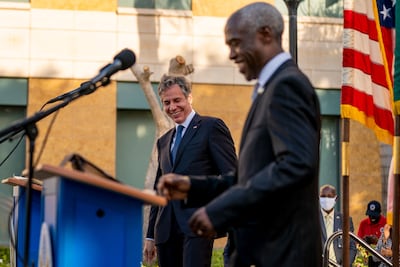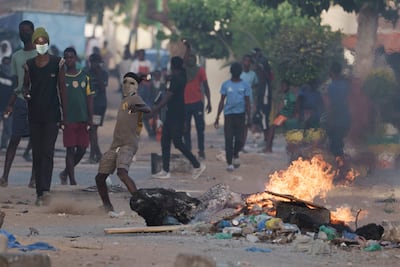Long regarded as a model of stability in a turbulent continent, Senegal is lurching towards calamitous civil strife after an explosion of violence ahead of presidential elections next February.
Senegal was once described by the late US diplomat Madeleine Albright as a “beacon of light for other African countries”, and held up by Nelson Mandela as an example of how disparate elements – Islamic, African and remnants of French colonialism – could “mingle to create and unique and distinctive culture”.
But these warm endorsements are giving way to grave security concerns as the country struggles to deal with escalating unrest, which has seen at least 23 people killed and hundreds more injured this month. Much is at stake, not least the vital tourist trade developed for Europeans eager to enjoy an African destination they could regard as a safe holiday destination.

The immediate trigger was a two-year jail sentence imposed on June 1 on Ousmane Sonko, leader of the Pastef party (African Patriots for Jobs, Ethics and Fraternity). Mr Sonko finished third when Macky Sall won a second five-term as president in 2019, but commands growing support among young Senegalese.
In what the Sonko camp sees as a trumped-up prosecution, he was cleared of raping a young beauty salon employee but jailed for two years for “corrupting” her.
The outcome, denounced by Mr Sonko as part of a conspiracy against him, led to fierce clashes between demonstrators and the security forces. In a massive military operation, 500 demonstrators were detained while the authorities restricted access to the internet and briefly banned the use of motor cycles popular among young people.

In Paris, some exiled Senegalese staged their own protest.
The judgment on Mr Sonko was delivered in his absence. Senegal’s justice ministry says he is liable to arrest “at any moment”. He claims that various attempts have been made in the past three years to have him imprisoned, so as to deny him a chance to succeed Mr Sall as president.
Given the anger already provoked by his treatment, it is feared that any attempt to enforce the prison sentence would spark further trouble on the streets. Feelings of solidarity with Mr Sonko are hardened by disillusion over failures to support people whose lives are blighted by rising prices for food, energy and other everyday needs.
Mr Sall’s government and Pastef blame each other for the violence. Mr Sonko, 48, formerly a whistle-blowing tax inspector with a taste for exposing companies and the Senegalese elite accused of using offshore schemes to dodge fiscal obligations, has openly encouraged protest, for example when he staged a 500km motorcade between Zinguinchor, a southern city where he was elected mayor last year, and the capital Dakar.
After the jail sentence was passed, Pastef urged supporters to “stop all activity and take to the streets”. Mr Sonko’s supporters believe the president is preparing an about-turn and may organise constitutional reform enabling him to stand for a third term.
For its part, the government blamed the trouble on acts of vandalism and banditry by Pastef militants intent on destabilising Senegal and plunging the country into chaos, jeopardising foreign investment and financial support just as progress is made on reducing massive debt.
Although the tough response to disturbances has restored some order, tensions remain high. France has expressed deep concern and called for a resolution to the crisis.
Disturbing footage of destructive revolt are at odds with the image Senegal presents to the world as it seeks to rebuild a tourist industry badly damaged by the pandemic. Before the current crisis, analysts were predicting a return to pre-Covid levels of visitors and tourism-driven employment next year, as well as significant growth between now and 2028.
Since gaining independence in 1960, Senegal has developed into what the World Bank described in a 2022 report as “one of the most stable countries in Africa with three peaceful political transitions since independence”. Every effort must be made on the part of Senegalese leaders and the country’s friends in the international community to ensure it can maintain that reputation.
The country is also known in popular culture for its gruelling Paris-Dakar motoring rally – now held in Saudi Arabia because of the risks to competitors passing through neighbouring Mauritania – and a stream of outstanding footballers who have graced the major European leagues. One of them, Bayern Munich’s Sadio Mane, and the celebrated Senegalese singer Youssou N’Door, are among public figures calling for dialogue and calm, though N’Door – who has a history of supporting the president and serving him as tourism minister and presidential adviser – has also been targeted in anti-government online attacks.

While seeking to steer a neutral course, France is reported to have advised Mr Sall to stick to previous assertions that he will not seek a third term. African media reports suggest President Emmanuel Macron assured him by telephone that he would offer a “way out”, though it is not clear whether this implies safe exile.
When Mr Sall won his second term with 58 per cent of the vote in 2019, he was accused of being behind the arrests and imprisonment of two rivals to keep them out of the race. If he decides to present himself for re-election, or Mr Sonko ends up behind bars, his presidential aspirations wrecked, the outlook for Senegal may be bleak.


